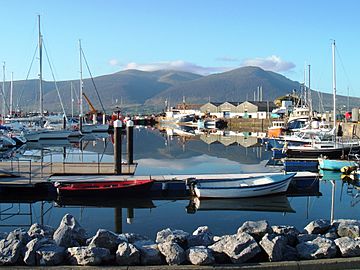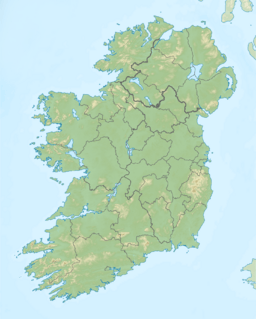Slieve Mish Mountains facts for kids
Quick facts for kids Slieve Mish Mountains |
|
|---|---|
| Irish: Sliabh Mis | |

Slieve Mish Mountains from across the Tralee Bay in the village of Fenit
|
|
| Highest point | |
| Peak | Baurtregaum |
| Elevation | 851 m (2,792 ft) |
| Dimensions | |
| Length | 19 km (12 mi) East–West |
| Width | 6 km (3.7 mi) |
| Area | 97.9 km2 (37.8 sq mi) |
| Naming | |
| English translation | [possibly] mountains of Mis |
| Language of name | Irish |
| Geography | |
| Location | Kerry |
| Country | Republic of Ireland |
| Provinces of Ireland | Munster |
| Topo map | OSI Discovery 71 |
| Geology | |
| Age of rock | Devonian |
| Type of rock | Purple cross-bedded sandstone |
The Slieve Mish Mountains (in Irish, Sliabh Mis) are a beautiful mountain range in County Kerry, Ireland. They are mostly made of a type of rock called sandstone. These mountains stretch for about 19 kilometers (about 12 miles) across the eastern part of the Dingle Peninsula.
The range has more than 17 important peaks. The main part of the mountains is around its highest peak, Baurtregaum. This area also has deep valleys like Derrymore Glen and Curraheen Glen, which were carved out by glaciers long ago.
Contents
What's in a Name?
The name "Slieve Mish Mountains" comes from the Irish language. The word "Sliabh" means "mountain."
The meaning of "Mis" isn't fully clear. Some experts think it might come from an old female name. If that's true, then "Slieve Mish" could mean "the mountains of Mis."
How the Mountains Were Made: Geology
Just like many other mountains in Kerry, the Slieve Mish Mountains are mostly made of a rock called Old Red Sandstone. This rock formed during the Devonian period, which was about 310 to 450 million years ago.
Ancient Earth
Back then, Ireland was located near the equator, where it was very hot. For about 60 million years, a huge basin (a low-lying area) called the Munster basin existed where Ireland is now. The areas of Cork and Kerry were like a big floodplain, where rivers often overflowed.
The rocks got their purple-reddish color from chemicals in the soil. You can still see this color today! There are almost no fossils in Old Red Sandstone.
Rock Types and Glaciers
Old Red Sandstone can be different types of rock. It includes sandstones, mudstones, siltstones, and conglomerates. Conglomerates are rocks that contain smaller, rounded pebbles, like quartz. You can see these pebbles all over the Slieve Mish Mountains.
The Slieve Mish range was also shaped a lot by glaciers. Glaciers are like giant, slow-moving rivers of ice. They created:
- Corries: These are bowl-shaped hollows, like the ones holding the upper lakes in Derrymore Glen.
- U-shaped valleys: These are valleys with a U-shape, like Derrymore Glen and Curraheen Glen.
However, these mountains don't have the sharp, rocky ridges that you might see in other ranges, like the MacGillycuddy Reeks.
Where Are They? Geography
The Slieve Mish Mountains are located between two large bays. Tralee Bay is on their northern side, and Dingle Bay is on their southern side.
The range stretches for 19 kilometers (about 12 miles). It goes from just outside the town of Tralee in the east to the middle of the Dingle Peninsula in the west. People often call the range the "backbone" of the Dingle Peninsula. This is because most of its main peaks are lined up along a narrow "spine" that runs from southwest to northeast. At its widest point, this spine is about 6 kilometers (about 3.7 miles) across.
Main Peaks
The most important part of the range is around its highest point, Baurtregaum, which is 851 meters (2,792 feet) tall. The main peaks sit along Baurtregaum's high, grassy ridge. These include:
- Baurtregaum Far NW Top (603 meters or 1,978 feet) in the east.
- Caherconree (835 meters or 2,740 feet) in the west.
- Gearhane (792 meters or 2,598 feet).
Baurtregaum has two large valleys that were formed by glaciers:
- The Curraheen Glen: This valley is 4.5 kilometers (about 2.8 miles) long and runs to the east. The Curraheen River flows through it.
- The Derrymore Glen: This valley is shorter but deeper and runs to the north. It has the Derrymore River and three lakes that sit in corries.
After a mountain pass called Bóthar na gCloch (which means "road of the stones") to the west, the mountains rise again. Here you'll find Knockbrack (459 meters or 1,506 feet) and Lack Mountain (465 meters or 1,526 feet). The range then continues southwest, ending at Cnoc na Stuaice (483 meters or 1,585 feet).
Important Peaks
The Slieve Mish Mountains have many peaks. Here are some of the most important ones, listed by their height.
Marilyn: A mountain of any height that rises at least 150 meters (492 feet) above the land around it.
| Height Rank |
Name | Height (m) |
Height (ft) |
Prominence (m) |
|---|---|---|---|---|
| 1 | Baurtregaum | 851 | 2,792 | 643 |
| 2 | Caherconree | 835 | 2,740 | 129 |
| 3 | Baurtregaum NE Top | 819 | 2,687 | 14 |
| 4 | Gearhane | 792 | 2,598 | 17 |
| 5 | Baurtregaum NW Top | 723 | 2,372 | 18 |
| 6 | Baurtregaum Far NE Top | 603 | 1,978 | 28 |
| 7 | Castle Hill | 600 | 1,969 | 35 |
| 8 | Caherbla | 586 | 1,923 | 91 |
| 9 | Moanlaur | 566 | 1,857 | 289 |
See also
 In Spanish: Montañas Slieve Mish para niños
In Spanish: Montañas Slieve Mish para niños
 | Leon Lynch |
 | Milton P. Webster |
 | Ferdinand Smith |


